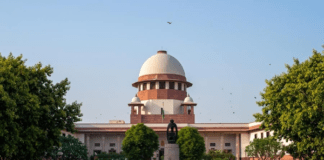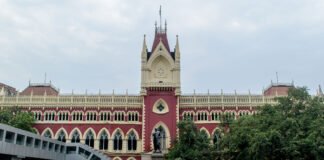The Supreme Court warned against misusing stringent laws like the UP Gangsters Act, stressing the need for judicial discretion and protection of personal liberty.
Subheading (Intro Sentence):
In a significant ruling, the Supreme Court stressed that penal laws like the Uttar Pradesh Gangsters and Anti-Social Activities (Prevention) Act should not become instruments of harassment.
Judicial Discretion Must Guide Extraordinary Laws
The Supreme Court has issued a cautionary note to law enforcement agencies and lower courts across the country, particularly in Uttar Pradesh, stating that the UP Gangsters Act must not be invoked routinely or without due consideration.
A bench led by Justice Surya Kant made this observation while quashing proceedings against an accused who was charged under the Act despite no clear link to organised criminal activity. The court emphasised that constitutional protections, especially those relating to personal liberty, hold paramount importance when extraordinary laws are involved.
“The constitutional guarantee of personal liberty acquires even greater significance when extraordinary legislation with severe consequences is applied,” the court stated.
The Context: Preventive Law or Pretext for Persecution?
Originally enacted in 1986, the UP Gangsters and Anti-Social Activities (Prevention) Act empowers law enforcement to pre-emptively detain individuals believed to be habitual offenders or involved in gang-related activities. However, critics argue that the law is increasingly used to target individuals, especially in cases where standard IPC sections would not suffice for pre-trial detention or property seizure.
In the present case, the accused was already facing criminal proceedings under general laws. The additional invocation of the Gangsters Act appeared to be excessive, prompting judicial scrutiny.
“Merely having an FIR registered for a cognisable offence cannot ipso facto render one a gangster under the Act,” the court clarified.
Misuse and Pattern of Arbitrary Application
The apex court’s remarks reflect a growing concern over the misuse of preventive detention laws, particularly those with harsh bail provisions and significant discretion granted to the police and magistracy.
Recent years have seen a spike in cases where stringent laws like the Gangsters Act, UAPA, and NSA are invoked in situations that arguably do not meet the threshold of ‘extraordinary threat’ or organised criminal conduct. The Supreme Court’s judgment is likely to have a ripple effect on how such laws are interpreted by lower courts going forward.
Legal experts believe this could offer significant relief in cases where individuals are charged with these laws in a manner that undermines the principle of presumption of innocence.
Role of Judiciary in Checking Executive Overreach
The judgment reinforces the judiciary’s role as a constitutional safeguard against the excesses of executive power. By underlining that statutory powers must be exercised in good faith and for legitimate objectives, the court signalled a reaffirmation of due process.
This decision also mirrors the concerns raised in previous landmark cases such as Arnesh Kumar v. State of Bihar, where the apex court had set parameters for arrest under Section 41A of the CrPC to prevent arbitrary detention.
You can read more about such landmark cases and their implications in our Insight section.
Political and Legal Reactions
While the Uttar Pradesh government has not officially responded, the ruling is expected to influence how district police units proceed with charging individuals under the Gangsters Act.
Senior advocate Prashant Bhushan, while speaking to The Legal Observer, said, “The Supreme Court’s concern is timely. Laws meant to deal with genuine organised crime are being used indiscriminately, often to harass or suppress dissent.”
Civil rights organisations have also welcomed the ruling, calling it a necessary intervention in curbing the criminalisation of dissent and overreach by state authorities.
A Message to Lawmakers and Law Enforcers
The court’s decision sends a clear message: Extraordinary laws should not become the norm. They must be applied sparingly, with judicial supervision and on the basis of solid evidence. The unchecked use of such laws not only violates personal freedoms but also erodes public trust in the legal system.
For further updates on developments related to the Supreme Court and high-profile legal rulings, visit our News Section.
Watch Our Legal Breakdown
Catch our in-depth video analysis on this ruling and its implications on our official YouTube channel: @TheLegalObserver
Internal Links Embedded:





